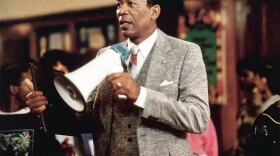When Experts Attack!
Fighting misinformation, zapping half-truths, putting pseudoscience in a headlock, and setting the record straight — one podcast at a time. Each episode of “When Experts Attack!” is a conversation with a knowledgeable specialist in politics, science, art, business, society, health and more. Listeners get to know these experts’ stories, discover why they’re super credible and hear them answer the pivotal question: What does everybody get wrong about what you do? And then experts play a jam on the Theremin — just for kicks. Hosted by Brendan Lynch, “When Experts Attack!” is produced by the KU News Service and presented by Kansas Public Radio. Subscribe on libsyn.com.
-
Anthropologist John Hoopes has made it his personal and professional mission to ferret out pseudo-science in the field of archaeology. Specializing in the…
-
Morgan Freeman has given many powerful, memorable performances. His role as Mr. Clark, a New Jersey-based high school principal known for dispensing…
-
Politicians don’t say 'I'm sorry' for anything anymore. We explore why with Brett Bricker, a national-champion debater and debate coach who researches…
-
Seen today as a bastion of women’s rights, guest Nikki Perry, author of “Policing Sex in the Sunflower State” explains how Kansas once locked up more than…
-
Basketball coaches have a million tips on how to be a better shooter. But guest Dimitrije Cabarkapa says scientific evidence shows which are best. Keeping…
-
There’s been a drop in how much time people around the world spend in face-to-face interaction, but guest Jeffrey Hall says don’t blame social media. It…
-
According to Valery Dzutsati, visiting assistant professor of political science at the University of Kansas, the attempted conquest of Ukraine has exposed…
-
It’s been called The Great Resignation or, more poetically, The Big Quit. Since last July, more than 20 million Americans have left their jobs…
-
Do we act out of a sense of what’s moral or do we act out of self-interest? Dale Dorsey, professor of philosophy at the University of Kansas, argues that…
-
Media tend to cover meditation and mindfulness as potential panaceas that can be good for everyone. But assuming mediation and mindfulness will help…










